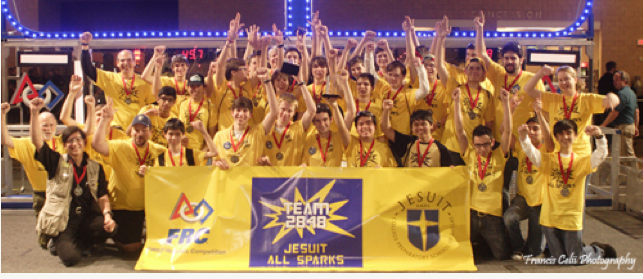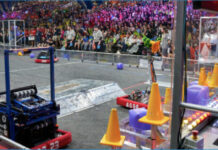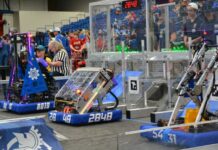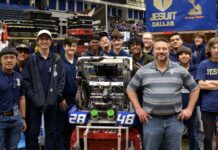The game begins. Jesuit’s robot is racing around the court, collecting balls and launching them into the overhead goal. Until disaster strikes, disaster for the other teams at least. The Jesuiot Robot and another team’s robot collide, and the other team’s robot is flipped over, lying helpless on the ground. Only a little bit later, the Jesuit robot collides with another robot, tearing off its pneumatics. With the mechanical carnage lying in its wake, the Jesuit Robotics team is penalized for being “overly aggressive.”
On the week of April 5th, the Jesuit Robotics team, also known as team 2848 and the Jesuit Allsparks, went down to Houston, Texas to compete in a regional FRC tournament against 148 other teams. At the tournament, the team grouped up with two other teams to form an alliance. An alliance is a group of three indiviudal teams that work together against another alliance in order to complete the game’s objective. This year, that objective is to launch a large ball, similar in dimensions to those of a large exercise ball, into an overhead goal. Alliances can earn points by shooting into this goal, shooting over the truss, which is located at the middle of the court, or by pushing the balls into a goal on the ground; however, the lower goal is not worth very many points, so the better teams aim higher at shooting into the overhead goal and over the truss.
The Jesuit Robotics team and its alliance made it all the way to the semifinals, where they were unfortunately eliminated. Although they did not come home with a first place trophy, the team won the judge’s award and was complemented on their aggression and outspokenness, an irony considering the team was often penalized for excessive aggression.
The team got off to a rough start due to an array of penalties being called that the judges didn’t usually call. Apparently, a couple of teams complained about Jesuit’s bold playing style, so the referees felt as though they should discourage the playing style with penalties. In their final game, the team accidentally flipped over one robot and tore the pneumatics off of another, and so, the team was heavily penalized and ended up losing. To be frank, the team definitely had the potential and the capability to go much further.
Upset by the referees calls, many of the team members felt cheated. For example, Drew Curran ’15 specifically mentioned one instance where they were unjustly penalized: “One time, we were trying to take a shot, and two robots were hitting on us, and we got called for aggression.”
On the court, the team ran into problems because they “changed too much,” according to the Vice President of the team, Jerray Dewa ’14. “Our biggest problem other than the ref calls was that we had trouble getting the shots tuned in. To be honest, we made a few too many improvements on our practice bot during the time between the regionals, and we simply did not have enough time to tune in our competition bot,” commented Dewa.
According to Kieran Celli ’15, the robot’s operator, the team was able to make 80% of the shots that they took, when they were shooting under optimal conditions. However, that’s not always the case. In such a fast paced game, sometimes, the team had to take quick shots or shots that were at a bad angle. These are easily fixed issues as they can be resolved with more practice.
Overall, the team did alright, but not as well as they had expected or hoped. This one tournament appears to be just a fluke, caused by a series of unanticipated and/or unwarranted penalties. The team still competes at the final tournament, the championship, in St. Louis, Missouri. This competition will run April 24-26, so make sure to wish the team good luck as they prepare for the biggest tournament in the country!






